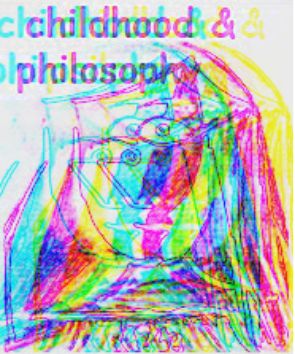a mudança pós-moderna nos estudos da infância e suas implicações pedagógicas
DOI:
https://doi.org/10.12957/childphilo.2024.82031Palavras-chave:
estudos da infância, pós-modernismo, natureza da infância, oposição binária, subjetividadeResumo
Este artigo reflete sobre a mudança pós-moderna nos estudos da infância e o seu impacto na educação. À medida que os estudiosos questionam a noção moderna de infância, o discurso do pós-modernismo tem entrado no domínio dos estudos da infância, dando origem a várias novas perspectivas. As principais caraterísticas da mudança pós-moderna nos estudos da infância incluem: 1) a rejeição do essencialismo em relação à infância e o reconhecimento da diversidade inerente a ela; 2) a desconstrução de oposições binárias e a defesa da natureza heterogênea da infância e do conceito de “devir-criança”; 3) a dissolução do sujeito moderno associado à infância e à reconstrução do sujeito pós-moderno. Os estudos pós-modernos da infância trarão alguns impactos positivos para o campo da educação, como focar nas diferenças entre as crianças em vez de condensá-las num mapa unificado, além de remover o adultismo da educação e enfatizar a construção de novas formas de subjetividade infantil na educação. Contudo, isso também trará muitos desafios à educação, como o questionamento da essência da infância e da boa educação, o abalo dos alicerces da existência educativa devido à dissolução da infância, e a perda de significado educativo devido à construção fluida e mutável da subjetividade infantil. Isso destaca a importância de reconhecer que, à medida que a educação abraça o discurso da infância pós-moderna, tanto as suas promessas como os seus perigos irão permear o domínio educativo.
Downloads
Referências
Alloway, N. (1997). Early childhood education encounters the postmodern: What do we know? What can we count as ‘true’? Australasian Journal of Early Childhood, 22(2), 1–5.
Aries, P. (1962). Centuries of Childhood: A Social History of Family Life (R. Baldick, Trans.). Alfred A. Knopf.
Best, S., & Kellner, D. (1991). Postmodern Theory: Critical Interrogations. Macmillan Education LTD.
Biesta, G. (2013). The beautiful risk of education. Routledge.
Dahlberg, G., Moss, P., & Pence, A. (1999). Beyond Quality in Early Childhood Education and Care: Postmodern Perspectives. Falmer Press.
Dallmayr, F. R. (1981). Twilight of Subjectivity: Contributions to a Post-individualist Theory of Politics. The University of Massachusetts Press.
Deleuze, G., & Guattari, F. (1987). A thousand plateaus: capitalism and schizophreni (B. Massumi, Trans.). University of Minnesota Press.
Derrida, J. (1981). Positions. trans A Bass. The University of Chicago Press.
Derrida, J. (1997). Of grammatology (G. C. Spivak, Trans.). The Johns Hopkins University Press.
Eagleton, T. (1996). The Illusions of Postmodernism. Blackwell Publishing Ltd.
Edwards, R., & Usher, R. (1994). Postmodernism and Education: Different Voices, Different Worlds. Routledge.
Feng, J. (2003). Lectures on Post-modernist philosophy. Commercial press.
Franks, J. (1994). Post-modern concept of subjectivity. Foreign social sciences, (1), 11–16.
Fry, K. (2014). Lyotard and the philosopher child. Childhood & Philosophy, 10(20), 233–246.
James, A., & Prout, A. (1997). Constructing and Reconstructing Childhood. Falmer Press.
James, A., Jenks, C., & Prout, A. (1998). Theorizing Childhood. Polity Press.
Kennedy, D. (1992). The Hermeneutics of Childhood. Philosophy Today, 36(1), 44–59.
Kennedy, D. (2006). Changing conceptions of the child from the renaissance to post-modernity: a philosophy of childhood. The Edwin Mellen Press.
Kennedy, D. (2013). Becoming Child, Becoming Other: Childhood as Signifier. In A. Muller (Ed.), Childhood in English Renaissance. Wissenschaftlicher Verlag Trier.
Kohan, W. O. (2011). Childhood, Education and Philosophy: Notes on Deterritorialisation. Journal of Philosophy of Education, 45(2), 339–357.
Lyotard, J.-F. (1984). The postmodern condition (G. Bennington & B. Massumi, Trans.). University of Minnesota Press.
Lyotard, J.-F. (1992). Manimise. Philosophy Today, 36(4), 419–427.
Lyotard, J.-F. (1992). That which resists, after all. Philosophy Today, 36(4), 402–417.
Mai, Y. X. (2013). Deleuze’s philosophical poetics. Guangxi Normal University Press.
Meynert, M. (2013). Conceptualizations of childhood, pedagogy and educational research in the postmodern: A critical interpretation [Licentiate thesis, Education]. Lund University.
Miao, M. (2016). The essence of Childhood: thinking based on two Childhood Research Paradigm. Journal of Anhui normal University, (3), 390–396.
Petropoulos, G. (2023). Challenging adult-centrism: speaking speech and the possibility of intergenerational dialogue. childhood & philosophy, 19, 1–22. https://doi.org/10.12957/childphilo.2023.73517
Postman, N. (1982). The disappearance of childhood. Delacorte Press.
Prout, A. (2005). The Future of Childhood. Routledge Falmer.
Turner, S. M., & Matthews, G. B. (1998). The Philosopher’s Child: Critical Perspectives in the Western Tradition. University of Rochester Press.
Wall, J. (2019). From childhood studies to childism: reconstructing the scholarly and social imaginations, Children’s Geographies, 20(3), 257–270. https://doi.org/10.1080/14733285.2019.1668912
Wang, M. A. (2000). The philosophical discourse of post-modernity. Zhejiang people’s Publishing House.




